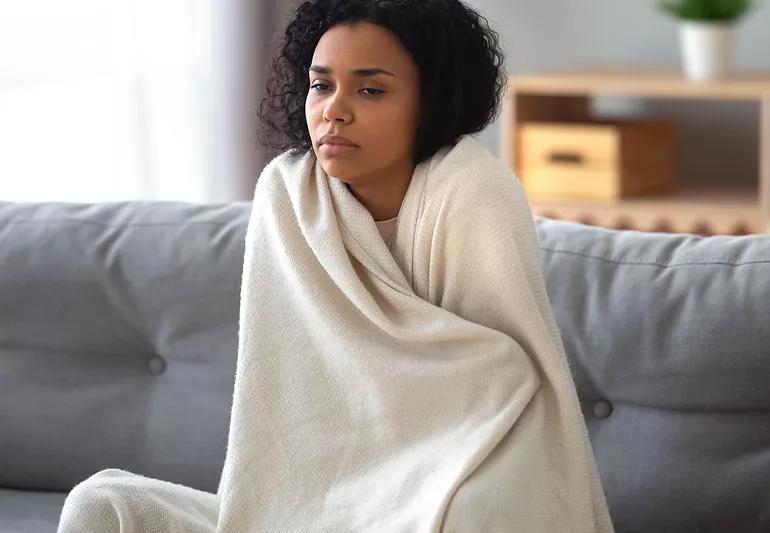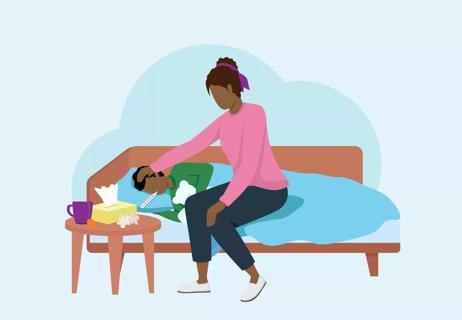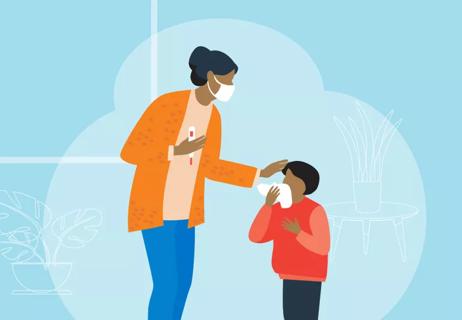Is it just a passing chill or something more serious?

Are you the kind of person who always needs a pile of blankets no matter what the thermostat says? Sure, we all feel the freeze on a cold winter’s day or the mechanical chill of the office air conditioner. But if you’re constantly shivering no matter the temp, there may be more going on.
Advertisement
Cleveland Clinic is a non-profit academic medical center. Advertising on our site helps support our mission. We do not endorse non-Cleveland Clinic products or services. Policy
Plenty of people are simply warm-natured (as in, prefer it to be warmer!), and any temperature below a certain threshold will induce a chill. But a few medical issues could also be responsible, all of which deserve the attention of your healthcare provider. To better understand the possibilities, we talked to internal medicine specialist Janet Morgan, MD.
One condition with which feeling cold is often connected is anemia. There are a few different types of anemia, but the main result of each is the same: A drop in red blood cells. That drop also means your body isn’t getting its necessary amount of oxygen, which results in that chilly feeling.
“When you’re lacking oxygen, you get that cold feeling and fatigue,” says Dr. Morgan. Other symptoms of anemia that she notes include:
There are a number of treatments for anemia, including iron supplements and changes to diet, but you need to consult with your healthcare provider as soon as possible.
Whether it’s a decreased circulation or something that’s blocking your circulation, poor blood flow is another potential cause of your chilly disposition. “People with a decreased circulation to their extremities are definitely going to feel cold, especially in their hands and feet,” says Dr. Morgan. While there are a number of reasons your circulation may be low, there are a few you should be looking for.
Advertisement
One is an acute blockage, like blood clots. “If there’s an acute blockage in the arteries of your leg or your thigh, your legs can feel cold and that’s worrisome,” Dr. Morgan notes. “That’s an emergency that warrants immediate attention.”
Another cause can be plaque buildup in your arteries, also known as peripheral artery disease. That buildup can get to the point of restricting blood flow and the delivery of oxygen to your body resulting in feeling cold.
One more potential cause is Raynaud’s phenomenon, a condition in which blood vessels, particularly in your fingers and toes, constrict, which results in low blood flow. The condition is caused by emotional stress or exposure to cold.
Hypothyroidism is when your thyroid produces a lower amount of hormones than your body is used to for regulating your metabolism and body temperature.
“It’s part of thermoregulation, the process by which your body adjusts your temperature to stay in a normal range,” Dr. Morgan explains. “For instance, when you sleep, your body slows itself down to conserve energy and your body cools.”
Without the necessary amount of hormones, the same thing happens when you’re awake: Your metabolism slows down, causing more of your body processes to slow and resulting in that low body temperature.
Loss of body fat is another reason you may start feeling cold, says Dr. Morgan, and there are several ways this can happen.
While body fat can help keep your body temperature normal, it should be maintained as part of a healthy diet. Be sure to consult your healthcare provider to make sure your diet is doing everything it should for your body.
The big question, then, is when to seek medical attention for your cold condition. After all, if it’s the dead of winter and you live in a drafty house, you’re probably going to feel cold more often than not. But, notes Dr. Morgan, there are telltale signs.
“There’s no real time frame for your cold feeling as it could be passing,” she says, “but you should pay attention to whether or not your cold feeling is out of proportion.”
If you’re keeping your house hot and guests are pointing out how warm it is and you’re still always cold — that’s a sign something’s going on. “If everyone else in your household is throwing on an extra sweater, you know it’s not just you. But if you’re the only one, then you need to speak to your doctor.”
Advertisement
“You should also pay attention to other symptoms,” she adds. “If you’re feeling cold in combination with other things like fatigue, tingling feelings in your extremity or weakness, those are red flags that there’s more going on than a low thermostat.”
If your feelings of cold are debilitating or acute, those are also reasons to speak with your doctor. “Maybe you’re so cold your teeth are chattering or you’re not usually cold but then you notice a sudden change. Those are more reasons to take care of your health and talk to your doctor,” advises Dr. Morgan.
Advertisement
Learn more about our editorial process.
Advertisement

Any fever, especially one of 100.5 degrees Fahrenheit or higher, should trigger a call to your oncologist — and maybe a trip to the ER

A combination of rest, fluids and over-the-counter medications can help you feel better fast

When your body is fighting infection, your internal temperature rises as a defensive response

Most cases are mild and can be treated at home, but some situations may require medical care or a trip to the ER

It can cause alcohol poisoning and other serious health issues, especially in kids

It’s important not to give them fever-reducing medications right off the bat

What you need to know about these common misconceptions

Wearing a scarf, adjusting your outdoor activities and following your asthma treatment plan can help limit breathing problems

Your diet in the weeks, days and hours ahead of your race can power you to the finish line

When someone guilt trips you, they’re using emotionally manipulative behavior to try to get you to act a certain way